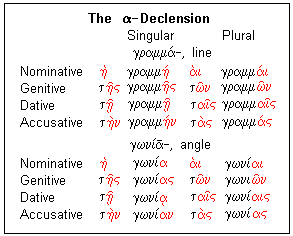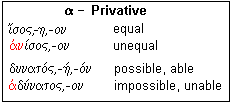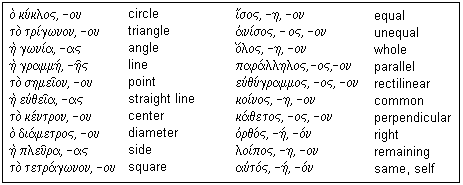Lesson γ':The α-Declension and Adjectives
 The declension of feminine nouns whose stem ends in long α is shown in the Figure. Unless the stem ends in ια or ρα, the α changes to η in the singular, as it does in the definite article. The long α in the stem of grammh/ changes to η in the singular by the rule given here. Note the close analogies with the o-declension. The genitive plural of feminine nouns is always accented on the ultima. There are also nouns with a short α, where the α does not change to η in the singular even though ι or ρ do not precede it. They are declined as the example shown. An example is qa/latta, "sea."
The declension of feminine nouns whose stem ends in long α is shown in the Figure. Unless the stem ends in ια or ρα, the α changes to η in the singular, as it does in the definite article. The long α in the stem of grammh/ changes to η in the singular by the rule given here. Note the close analogies with the o-declension. The genitive plural of feminine nouns is always accented on the ultima. There are also nouns with a short α, where the α does not change to η in the singular even though ι or ρ do not precede it. They are declined as the example shown. An example is qa/latta, "sea."
 There are also masculine nouns of the α-declension. The nominative singular adds a σ, and the genitive singular ending is -ου. The article is, of course, the same as that shown for the o-declension in Lesson 2. The name Euclid itself is a noun of this type.
There are also masculine nouns of the α-declension. The nominative singular adds a σ, and the genitive singular ending is -ου. The article is, of course, the same as that shown for the o-declension in Lesson 2. The name Euclid itself is a noun of this type.
An adjective is a word that explains or characterizes a noun. It has no gender and number of its own, but takes those of the word it modifies, and is put into the same case. One says that the adjective agrees with the noun in gender, number and case. Adjectives usually come before the noun, or between the article and the noun, in Greek. This is called the attributive position, in which the noun and adjective become joined into one idea. When the adjective follows the noun, it is in the predicative position, and some form of the verb "to be" is considered to join them. Adjectives can be used alone as nouns, and take the appropriate endings.
Many adjectives use the masculine, neuter and feminine endings of the o- and α-declensions which you now know, and are called adjectives of three endings. Some adjectives of this class use the o-declension endings for the feminine as well, so that there are only two sets of endings, masculine/feminine, and neuter, so we have adjectives of two endings. This is particularly true of technical adjectives, and many will be found in Euclid. Although the endings of the article, the adjective and the word it modifies are all often the same, this is not generally true. Adjectives must agree with their noun in gender, number and case, whatever the endings may be. The article, where it appears, is always a reliable guide to gender, number and case.
 The adjectives for equal, unequal and impossible are much used in Euclid. They are shown in the box on the right. A word can be negated in Greek by prefixing an α (or αν before a vowel), which is called the α-privative. When the adjectives for equal and possible are negated, note that the declension changes from three endings to two endings, and that there may be a change in accent.
The adjectives for equal, unequal and impossible are much used in Euclid. They are shown in the box on the right. A word can be negated in Greek by prefixing an α (or αν before a vowel), which is called the α-privative. When the adjectives for equal and possible are negated, note that the declension changes from three endings to two endings, and that there may be a change in accent.
Exercises

Take one noun from the first column, and an appropriate adjective from the second column, and write out the article, adjective and noun in the four cases, singular and plural. There are 10 x 10 = 100 different possibilities! Do this until you are quite familiar with the words and their endings. All the words are taken from Euclid.
Return to Contents
Composed by J. B. Calvert
Created 10 September 2000
Last revised 14 June 2002
 The declension of feminine nouns whose stem ends in long α is shown in the Figure. Unless the stem ends in ια or ρα, the α changes to η in the singular, as it does in the definite article. The long α in the stem of grammh/ changes to η in the singular by the rule given here. Note the close analogies with the o-declension. The genitive plural of feminine nouns is always accented on the ultima. There are also nouns with a short α, where the α does not change to η in the singular even though ι or ρ do not precede it. They are declined as the example shown. An example is qa/latta, "sea."
The declension of feminine nouns whose stem ends in long α is shown in the Figure. Unless the stem ends in ια or ρα, the α changes to η in the singular, as it does in the definite article. The long α in the stem of grammh/ changes to η in the singular by the rule given here. Note the close analogies with the o-declension. The genitive plural of feminine nouns is always accented on the ultima. There are also nouns with a short α, where the α does not change to η in the singular even though ι or ρ do not precede it. They are declined as the example shown. An example is qa/latta, "sea." There are also masculine nouns of the α-declension. The nominative singular adds a σ, and the genitive singular ending is -ου. The article is, of course, the same as that shown for the o-declension in Lesson 2. The name Euclid itself is a noun of this type.
There are also masculine nouns of the α-declension. The nominative singular adds a σ, and the genitive singular ending is -ου. The article is, of course, the same as that shown for the o-declension in Lesson 2. The name Euclid itself is a noun of this type. The adjectives for equal, unequal and impossible are much used in Euclid. They are shown in the box on the right. A word can be negated in Greek by prefixing an α (or αν before a vowel), which is called the α-privative. When the adjectives for equal and possible are negated, note that the declension changes from three endings to two endings, and that there may be a change in accent.
The adjectives for equal, unequal and impossible are much used in Euclid. They are shown in the box on the right. A word can be negated in Greek by prefixing an α (or αν before a vowel), which is called the α-privative. When the adjectives for equal and possible are negated, note that the declension changes from three endings to two endings, and that there may be a change in accent.